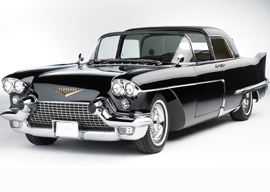
November 30, 2011

1956 Cadillac Eldorado
I just drove to Kansas and back, 2600 miles listening to the radio and pondering American industry, the heartland, affairs of the heart, and other organs.
On either side of the road were billboards advertising psychological release—deferred (up in heaven) or immediate (down at the Adult Superstore). This partly explains the problem: intense belief in the deferred and intense practice in the immediate.
The intense belief in competition coupled with the intense practice of monoculture led to the Dust Bowl. The fervent belief in monogamy wed to the fervent practice of adultery leads to a whole lot of D-I-V-O-R-C-E, as Tammy Wynette sings.
“It’s hard to conjure a more purely competitive entity than the human spermatozoa,” write Christopher Ryan and Cacilda Jethá in their book Sex at Dawn: How We Mate, Why We Stray and What It Means for Modern Relationships.
Well, there’s American industry. That’s a purely competitive entity. Or at least it used to be.
What happened? Bob Lutz, former executive at Chrysler, Ford, and GM, offers an explanation in his new book Car Guys vs. Bean Counters: The Battle for the Soul of American Business.
According to Lutz, American industry’s demise can be blamed on acronyms—“the MBA bean counters” and the CAFE (Corporate Average Fuel Economy) regulations Congress passed after the 1973 oil crisis mandating automakers to reengineer for higher fuel efficiency.
In Lutzian mythology, before the fall came the Golden Age when car designers such as Harley Earl and Bill Mitchell let their imaginations and their flamboyance run wild, before management started meddling with design and government started meddling with engineering. Before the Japanese penetrated the market.
In Sex at Dawn, the Golden Age was the time of the hunter-gatherers, when roots and grains grew wild, before humans started meddling with the soil and men started meddling with women’s wombs. Before outside influences penetrated our natural drives.
Agriculture brought private property, which brought monogamy: “Because of private property, for the first time in the history of our species, paternity became a crucial concern.” Vegetable seeds in specific furrows led to human seeds in particular burrows.
Religion enforced the fall from sexual innocence, but Ryan and Jethá’s thesis is that science only reinforced the same old story. The research universities preached the same faith as the cathedrals. The numerals concurred with the cardinals and the lab rats with the church mice:
Writing in the prestigious journal Science, anthropologist Owen Lovejoy suggested, “The nuclear family and human sexual behavior may have their origin long before the dawn of the Pleistocene [1.8 million years ago]. Well-known anthropologist Helen Fisher concurs, writing, “Is monogamy natural?” She gives a one-word answer: “Yes.” She then continues, “Among human beings…monogamy is the rule.”
From black robes to white coats—different garb, same theory. Matrimony is the way to go because it is sacred. Monogamy is the way to go because it is natural—which is the new sacred.